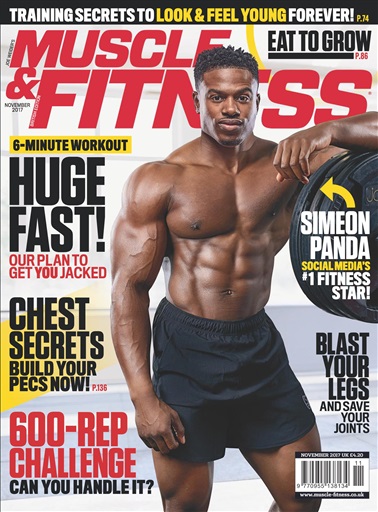Subscribe:
50 Years Ago:
More by Paul Carter:
More by by Greg Merritt:
greg merritt site:muscleandfitness.com:
You can, however give the muscle you're working a rest by shifting your attention to another area that may need more work - like maybe your calves or biceps.
Enter staggered sets!
The execution is simple: Insert a set or two of work on a smaller muscle, unrelated to the primary muscle you're working, between sets of your main exercises. For example, if you're training legs, you'd do all four sets of the leg press and then two sets of curls. Or, one set of leg presses followed immediately by curls. And since you're not hitting any of the same muscles, staggered sets shouldn't affect your primary muscle target - though they may tire you out. The result is more volume for that particular area and more calories torched overall, as you're not just sitting on your arse "resting up."
You'll thank us later.
Staggered Set Basics
- Train a smaller bodypart during rest periods between a bigger bodypart's sets. Make certain the smaller bodypart isn't stressed during compound exercises for the larger bodypart.
- Abs, calves, forearms, and cardio are the best candidates for staggered sets.
- The classic method of staggering sets is to alternate one set for the smaller bodypart between every two or more sets for the larger art.
- Try to plan combinations that you can do in the same workout area. For example, dumbbell flyes and crunches can be done on the same bench.
- Don't stagger sets if you need the rest period to recover from an exhausting set.
There are three ways to do staggered sets:
Unrelated Supersets
Alternate a set for a bigger bodypart with one for a smaller, unrelated bodypart. You probably won't want to do as many sets for the smaller bodypart, so skip supersetting one or two sets. For example, if you do 16 sets of 4 exercises for the back, do 12 sets of 3 exercises for the calves.
Asymmetrical Combos
Do one set for the smaller bodypart for every two or more sets for the larger bodypart. For example, complete one set for abs between every two sets of arms, and after 12 sets for biceps and 12 for triceps, you'll have also cranked out 12 sets for abs. This is the classic method of staggering.
Between Exercises
Perform one set for a smaller bodypart between exercises for larger bodyparts. For example, throw in a wrist curl set after completing every leg exercise, and over the course of a workout consisting of four exercises for quads and three for hams, you'll squeeze in seven sets for forearms, almost without noticing.
Problem Areas
Choose from these examples designed by hypertrophy specialist Paul Carter to enhance these commonly lacking bodyparts.
Weak Point: Rear Delts
Staggered with Arms Sets
1A. Barbell Curl, 3 x 10-12
1B. Bent Lateral Raise, 3 x 10-12
2A. Incline Dumbbell Curl, 3 x 8-10
2B. Standing Cable Rear Lateral Raise, 3 x 10-12
3A. Triceps Pushdown, 4 x 15
3B. Band Pull-Apart, 4 x 20
4A. Seated Dumbbell Bench Press, 3 x 10-12
4B. Cable Face-Pull, 3 x 12-15
Weak Point: Calves
Staggered with Back Sets
1A. Lat Pulldown, 4 x 10-12
1B. Standing Calf Raise, 1-2 x 15-20
2A. Barbell Row, 4 x 6-8
2B. Seated Calf Raise, 1-2 x 15-20
3A. Low Cable Row, 3 x 10-12
3B. Leg Press Calf Raise, 1-2 x 20-25
Weak Point: Forearms
Staggered with Quadriceps Sets
1A. Leg Extension, 3 x 20
1B. Behind the Back Wrist Curl, 3 x 20
2A. Leg Press, 3 x 20
2B. One-Arm Reverse Cable Curl, 3 x 12
3A. Back Squat, 2 x 12-15
3B. Hammer Curl, 2 x 10-12
Weak Point: Upper Chest
Staggered with Hamstring Sets
1A. Leg Curl, 6 x 8-10
1B. Incline Flye, 6 x 10-12
2A. Stiff-Leg Deadlift, 3 x 6-8
2B. Incline Dumbbell Press, 3 x 10-12
3A. Good Morning, 3 x 15
3B.Wide-Grip Smith Machine Incline Press, 3 x 8-10.



No comments:
Post a Comment